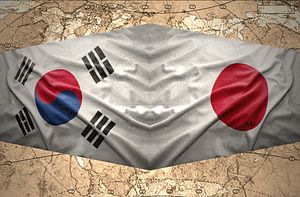Japanese Prime Minister Shinzo Abe and South Korean President Park Geun-hye will officially meet for the first time on the sidelines of the Nuclear Security Summit (NSS) in The Hague next week. The meeting will be held in a trilateral setting with U.S. President Barack Obama present as well. Generally, most Japanese Prime Ministers meet with an incumbent South Korea President within their first year in office. That Abe has taken longer to meet with Park highlights the changing nature of bilateral ties between South Korea and Japan.
Japan and South Korea, while both important allies for the United States, have had limited high-level diplomatic contact since Shinzo Abe’s return to power in Japan because of historical issues and a general mistrust of Abe’s intentions. Popular opinion in South Korea additionally regards Abe poorly over his nationalist views, considering him to be unapologetic for Japan’s wartime aggression, including the use of Korean “comfort women” by Japanese soldiers. Additionally, under Abe, Japan has approved a new defense posture, larger budget, and established a National Security Council — all trends that prompt observers in South Korea to fear a resurgent and military-focused Japan.
Given that the meeting at the NSS will take place in a trilateral setting, it is likely that Park and Abe will be able to avoid broaching the uncomfortable bilateral topics that have kept these two northeast Asian neighbors apart for more than a year now. Instead, it is almost certain that the three leaders will discuss the future of North Korea’s nuclear program and a potential resumption of the Six-Party Talks given burgeoning Chinese and North Korean interest. Additionally, the meeting will be the first time that President Obama will have met face-to-face with Abe and Park since China declared an Air Defense Identification Zone over the East China Sea — China’s maritime intentions are likely to be a major topic of discussion as well.
Given that Japan and North Korea will also be holding formal high-level bilateral talks in the future, it is likely that Abe could use the trilateral meeting to coordinate an agenda for approaching North Korea about its nuclear program outside of the stalled Six-Party Talks framework. U.S. negotiators have noted that the prospect of the Six-Party Talks resuming any time soon is out of the question barring major concessions and a change of direction in North Korea’s nuclear program. Japan alone might not have the leverage with North Korea to bring about any such concessions but it could nonetheless attempt to add that goal to its bilateral agenda with North Korea.
According to Reuters, that the meeting between Abe and Park is taking place in a trilateral setting as opposed to a bilateral one reflects a compromise on Park’s part given pressure from Washington that Seoul and Tokyo should improve ties ahead of President Obama’s regional tour of Asia in April. The United States has traditionally avoided mediating between its allies (with good reason), but Shinzo Abe’s transformational effect on East Asian international relations has prompted a reconsideration of that position.

































